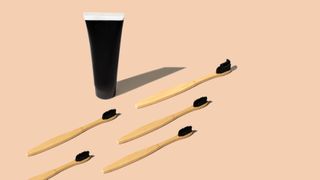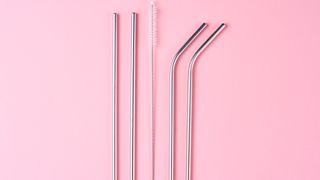Teeth whitening and coffee—your guide to sipping drinks that stain
Want to stop staining your teeth? Here’s what to do if whitening and coffee are both musts


Teeth whitening and coffee—two things that really don't mix. If you're trying to maintain your pearly whites—or are undergoing a whitening treatment—it's useful to know just how coffee can affect the appearance of your teeth.
We hate to break it to you, but your morning latte run and teeth whitening routine are at odds with each other. Even if your dental hygiene game is strong and you're brushing correctly with one of the best electric toothbrushes, it may not be enough.
While the latest coffee trends can have impressive health benefits (think improved digestion and increased fat loss), drinks like coffee and black tea are notorious for staining dental enamel. And, they can interfere with any teeth whitening goals you’re working on. No need to cut the caffeine just yet, though—there are things you can do to reduce the damage caused by drinks like coffee, black tea, red wine, and more.
Here's why certain drinks stain your teeth, and what you can do about it according to the experts. From brushing up on your cleaning routine to rinsing your mouth properly, follow these simple teeth whitening tricks and thank us later.
How does coffee stain your teeth?
Coffee, among other beverages, stains your teeth because of one ingredient in particular that provides the distinctive flavor of your favorite drinks. “Many drinks such as coffee, tea, and wine contain tannins, an organic substance found in plants. When the tannins build up on the teeth from drinking the beverages, they form stains,” explains Beverly Hills periodontist and cosmetic surgeon Dr Mahnaz Rashti. “Additionally, the enamel is porous. The stain from the drinks penetrates into the microscopic holes causing long-term staining of the teeth.”
According to Dr Jennifer Jablow, celebrity dentist and founder of intelliWHiTE, “Tannins promote staining because they enhance the ability of intensely pigmented compounds called chromogens to stick to the enamel.” But these beverages aren’t the only ones causing trouble. “Acidic foods and drinks also cause stains because acid erodes and softens the enamel, creating rough areas in the enamel,” and therefore making your teeth more vulnerable to stains, Dr Jablow adds.
You might not think of cola and sports drinks as aggressive stainers, but both are highly acidic and can do as much damage as a daily cup of Joe.
Sign up for the woman&home newsletter
Sign up to our free daily email for the latest royal and entertainment news, interesting opinion, expert advice on styling and beauty trends, and no-nonsense guides to the health and wellness questions you want answered.
Teeth-staining drinks
- Coffee
- Black tea
- Red wine
- Dark-colored fruit juices like pomegranate, cranberry, and grape juice
- Sodas, especially dark colas
- Sports drinks and energy drinks
“However, even if you have a diet that has no stain-causing foods or beverages, your teeth will still naturally yellow over time,” adds Dr Adrienne Hedrick of Longmont Dental Loft.

Teeth whitening and drinking coffee risks
Whitening products work by targeting staining agents on your teeth. “The active ingredient in teeth whitening is hydrogen peroxide. The peroxide reacts with the bonds of the chromogen stain compounds and breaks them down, rendering them colorless," explains Dr Jablow.
However, this process can be somewhat harsh on your teeth. “Bleaching and whitening your teeth cause the texture and form of the enamel surface to change,” says Dr Rashti. So, if you keep drinking those tannic and acidic drinks after your whitening treatments, the staining will only get worse as time goes by, Dr Rashti reveals. If you’re actively whitening your teeth, it’s important to be careful around these types of beverages. Drinking acidic energy drinks or dark roast coffee after bleaching won’t just tint your teeth, but will also compromise your enamel and could contribute to long-term damage and sensitive teeth.
If you are trying to remove beverage stains from your teeth, you need to be just as careful. “Coffee stains can be removed by brushing your teeth using a paste consisting of baking soda and hydrogen peroxide,” suggests Dr Rashti. Just keep this in mind: “They are both very abrasive and can cause permanent damage to the teeth and gum if used too often.”

Four ways to minimize stains when sipping coffee
Even if you’re using the best whitening toothpaste or having professional whitening treatments done, drinking acidic or dark liquids can interfere with your progress. These expert tips can help you keep your teeth whiter, while ensuring you still get that caffeine fix.
1. Sip quickly
“The largest contributor to yellow teeth that I see in patients is drinking coffee,” notes Dr Hedrick. “However, if somebody doesn’t want to give it up, I recommend not sipping coffee all morning. Instead, make sure you drink all of it in a short amount of time, such as 15 minutes.” The more time you spend indulging in your drink, the more opportunities you’re giving the liquid to stain your teeth, so try to consume it in one short sitting.
2. Use a straw
Whether you drink iced coffee or dark cola, Dr Jablow suggests sipping it through a straw. This can help keep the staining agents away from your front teeth, which you probably want to keep the whitest. Stash a reusable straw in your bag and you’ll always be prepared.
3. Rinse your mouth with water
After satisfying your tastebuds, follow up with some water. Dr Jablow says this can “dilute the stains” and prevent the dark or acidic drinks from settling in on your enamel.
4. Brush after 30 minutes
“The best solution to continue enjoying coffee, tea, and other drinks without getting stained teeth would be to brush 30 minutes after drinking them,” according to Dr Rashti. “The 30 minutes of time allows the acidity that the drink has left behind to neutralize in your mouth. Once the wait is over, brush your teeth for at least two minutes.”
woman&home thanks Dr. Mahnaz Rashti, Dr. Jennifer Jablow of intelliWHiTE, and Dr. Adrienne Hedrick of Longmont Dental Loft for their time and expertise.
Ciara McGinley is a meditation practitioner and health journalist. She qualified as a meditation teacher with the British School of Meditation in 2020 and is the founder of Finding Quiet, a series of classes, workshops and retreats that combine meditation practices and mindfulness techniques to make mindful living realistic in an always-switched-on modern world. She is all about bettering that mind-body connection but believes wellness looks different to everyone.
Ciara is also the former Health Channel Editor at woman&home and has covered all things health and wellbeing for years, from fitness to sleep to relationships.
